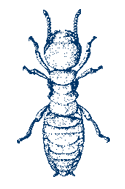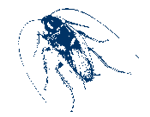Each year Maryland homes and yards come under attack from a variety of pests, ranging
from pests, such as termites, ants, bees and mice that invade structures to the weeds and insect
pests found in the lawn and landscape. The term "pest" includes insects, weeds, plant diseases,
nematodes, birds, rodents, snails and slugs. Materials used to control these pests are defined as
pesticides and would include the following groups of materials: herbicides, insecticides,
fungicides, miticides, growth regulators, desiccants, and rodenticides.
In an effort to control these pest problems, many homeowners rely on the pest control
services offered by commercial businesses. Unfortunately, each year a number of homeowners are
swindled by unlicensed or unscrupulous companies. During the past several years, the Maryland
Department of Agriculture s (MDA) Pesticide Regulation Section has seen an increase in the
number of homeowners defrauded by unlicensed firms. In one case, a Dorchester County resident
was duped out of $14,000 for unnecessary termite and wood boring beetle pest control and repair
services.
MDA is responsible for regulating the sale, use, and storage of pesticides and for
enforcing the Maryland Pesticide Applicators Law. As part of these requirements, MDA is also
responsible for establishing guidelines and requirements for the application of pesticides, the
certification of pesticide applicators and the licensing of businesses offering pest control services.
Any business that is offering pest control services, or applying any type of pesticide for hire, as
part of a service or contract agreement is required to have a Pesticide Business License and have
at least one certified pesticide applicator who has demonstrated competence in the use of
pesticides.

Pesticides, to be effective, are toxic to plants or animals and vary in the range of toxicity
to humans. The degree of hazard to humans or pets can be reduced if pesticides are applied
according to label directions and if the appropriate precautions are followed by the applicator and
the customer. For this reason, selecting a pest control service is just as important as selecting any
other professional service.
In order to help protect consumers and ensure they are getting the
service they paid for, MDA suggests that consumers take the following precautions before
contracting for any pest control services:
- Deal only with an MDA licensed firm. Ask to see a current copy of their Pesticide
Business License.

- Ask to see identification cards for sales and service personnel.
MDA regulations require that all pest control sales and service employees receive training and
obtain an identification card issued by MDA s Pesticide Regulation Section. The ID card must be
in the employee's possession and it will list the person's name, the business name and address and
show a photograph of the employee.
- Do not accept service over the telephone without other contact with the
company. Ask for an inspection of your property and for a written proposal that outlines the pest
control program. The proposal should include information on the following: pests to be
controlled; location and extent of the problem; control measures; pesticides to be used; special
precautions associated with the various pesticides; and, steps that can be taken to minimize or
prevent future infestations.
- Review the proposal, pesticide labels, warranties and guarantees, and discuss the
techniques that the applicator intends to use. Ask about alternatives that are available and inquire
about special instructions that should be followed to reduce the potential for pesticide exposure.
Make sure that you understand the proposal and that the pest problem actually requires the
proposed treatment.
- Contact at least three licensed firms to get a second and third opinion. There can
be a difference in the prices, level of services, pest control procedures, pesticides used, and
warranties or guarantees that each firm offers. Never let someone rush you into a decision about
pest control. Select by the value, not by price, and don't depend entirely on the salesman's
pitch.
- The company should be willing to listen to your concerns about your pest
problems and be able to provide effective and acceptable solutions to your concerns and
problems. The pest control company should have competent personnel that can diagnose
problems and respond to your questions and concerns.

- Obtain a written service agreement and ask if the service is
automatically renewed each year. If there is an annual renewal, request an annual written
confirmation. Check on possible penalties resulting from cancellation of the service agreement.
When canceling service agreements, make sure you putit in writing; don t do it over the
telephone.
- Pesticides should only be used as needed. Ask the company to tell you what
materials it plans on using and why.
- Check whether or not the company belongs to a professional trade association.
This can be an indication of a company s dedication to good service. Trade associations often
have consumer protection codes of ethics to be followed by their members and they keep their
members informed of the latest technical information in the industry.
- Check for complaints against firms that you have contacted. Call the Pesticide
Regulation Section at (410) 841-5710, the county Office of Consumer Affairs, or the Better
Business Bureau. Ask for references of other individuals who have used the company's or firm's
services, and contact them for additional information.
 All commercial pesticide businesses and public agencies that apply
pesticides must satisfy specific requirements for the protection of consumers as provided in the
Regulations pertaining to the Pesticide Applicators Law. They include the following:
All commercial pesticide businesses and public agencies that apply
pesticides must satisfy specific requirements for the protection of consumers as provided in the
Regulations pertaining to the Pesticide Applicators Law. They include the following:
- Upon the customer's request, the pest control company is required to give
the customer advance notice of a pesticide application. In addition, individuals who have
registered with MDA as a pesticide sensitive individual must receive prior notification of pesticide
applications made to lawn and ornamental plants on neighboring properties. Further information
on MDA's pesticide sensitive list can be obtained from MDA Pesticide Information Leaflet No.
12.
- Whenever a pesticide is applied, or at the time a customer enters into a contract
with a licensed pest control company, the customer must receive the following written
information:

- Name of the pest control business.
- Maryland pesticide business license number.
- Telephone number of the business.
- Maryland Poison Center telephone number.
- Common name or active ingredient of the pesticide products applied.
- One of the following - a copy of the pesticide label; a portion of a pesticide
label containing precautionary statements and environmental hazards; or a document compiled by
the pest control firm that contains appropriate health, safety, and environmental hazard
information taken from the pesticide label and approved by the Maryland Department of
Agriculture.
- After a pesticide has been applied to a lawn or to exterior landscape plants, the pest
control company must post a standardized sign at one or more specific locations on the property.
The customer is requested to keep the sign in place for 48 hours after the application. (Note:
Signs are not required for fertilizer applications.)
 You can minimize your exposure to pesticides by removing all cooking utensils, toys, pet
items, sports equipment, lawn furniture, and other similar items from the area to be treated;
closing windows and doors if an application is to be made outside; keeping adults, children and
pets away from treated areas not standing in the areas during or immediately after a pesticide
application; keeping off the treated area until the spray has dried or dusts have settled unless
instructed otherwise; reading the information provided by the pest control company and following
the precautionary statements for the pesticide applied to the property.
You can minimize your exposure to pesticides by removing all cooking utensils, toys, pet
items, sports equipment, lawn furniture, and other similar items from the area to be treated;
closing windows and doors if an application is to be made outside; keeping adults, children and
pets away from treated areas not standing in the areas during or immediately after a pesticide
application; keeping off the treated area until the spray has dried or dusts have settled unless
instructed otherwise; reading the information provided by the pest control company and following
the precautionary statements for the pesticide applied to the property.
Protect yourself, family, pets and property by asking questions and understanding the pest
problem and the proposed control methods. Evaluate the results to ensure the treatment was
successful and done as proposed. If you suspect that a company is offering pest control services
without being properly licensed, if a pesticide misuse has occurred, if you want to receive more
information on pesticide regulations, or would like to request an investigation, contact the:
Maryland Department of Agriculture
Pesticide Regulation Section
50 Harry S Truman Parkway
Annapolis, MD 21401
Telephone: 410-841-5710
Fax: 410-841-2765
Send E-mail to Robert Hofstetter
To find out more, call Pesticide Regulation at 410-841-5710.